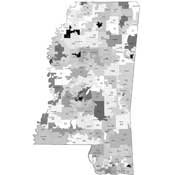Wednesday, November 9, 2011
Mississippi's ongoing battle over redistricting will keep going on at least into the near future.
On Nov. 1, the U.S. Supreme Court declined to hear an appeal from the Mississippi conference of the NAACP over the matter. In doing so, the court affirmed a lower court's decision to allow the 2011 elections to take place without having a redistricting plan in place.
The NAACP called the ruling "unfair," arguing that allowing the election to proceed violates the constitutional principle of one-person one-vote. "Some voters live in districts that have twice the population as other districts," the NAACP said in a statement about the ruling, vowing to continue litigating the issue, which will be costly to both the NAACP and state taxpayers.
Carroll Rhodes, the NAACP's attorney, told the Jackson Free Press this week that with the lawsuit, the organization hopes to save Mississippi taxpayers some money.
"This is at a time when revenue for the state is dwindling," he said. If lawmakers reach a redistricting agreement in the coming legislative session, Rhodes said it's possible that a special election will be held in summer 2012. Such an election, he estimates, could cost anywhere from a couple million dollars to administer the election up to the tens of millions in legal fees and candidate fundraising. Having the special election coincide with federal elections would not only be more cost effective, according to Rhodes, but it would aid African-American candidates as black voter turnout is expected to high next year when President Barack Obama is up for reelection.
The recent redistricting ruling is just the latest wrinkle in a saga that has been unfolding all year long. Last December, before the legislative session began, many believed that redistricting would go smoothly as the state's population grew by just 120,000 individuals between 2000 and 2010. The incremental growth rate didn't stop Mississippi politicians from squabbling, however.
Over the course of the year, the House, Senate, Lt. Gov. Phil Bryant, Secretary of State Delbert Hosemann and the NAACP all weighed in with plans of their own.
In March, the Republican-controlled Senate and the House, which Democrats control, each shot down the other chamber's redistricting plan. That same month, the civil-rights organization asked a federal court to convene a three-judge panel to prevent legislators from running in their existing districts in the August primaries, claiming that the districts did not represent black voters equitably.
For decades, the House and Senate approved the opposite chamber's plan without issue in a kind of "gentleman's agreement," House Speaker Billy McCoy, D-Rienzi, told the Jackson Free Press earlier this year.
This year, however, at Bryant's urging, the Senate refused to approve the House plan multiple times. Bryant argued that the House plan does not create enough new majority-Republican House districts to reflect population growth in conservative districts over the last 10 years.
Republicans believed their party should have more GOP-tilting districts in the House to reflect growth in majority-white districts, which would cut into the number of black-majority districts in the House plan floated earlier this year.
On the House side, Democratic leaders say the state needs an equitable number of majority-black districts to reflect the state's high proportion of African American voters (who tend to vote for Democrats). After the Senate refused to approve the House's second map in May, the NAACP filed a suit in federal court, asking that the court take redistricting out of the hands of the deadlocked Mississippi Legislature and institute a plan reflecting the state's sizable black population.
Every 10 years, states are required to look at their electoral boundaries and redraw the maps to reflect shifts and growth in population. Giving this power to state legislatures means the process is often highly politicized, frequently manipulated by political parties to ensure electoral smooth-sailing for their candidates.
Common tactics include redrawing districts to concentrate geographically dispersed voters of the same political persuasion into a single district, diluting the strength of a voting bloc by grouping them with a larger group that tends to vote the other way and redrawing the lines around incumbents to force them to run in new districts.
Because of the tendency for hyper-politicization of redistricting at the state level, a number of states instead charge bi-partisan commissions with the task. Mississippi is one of 36 states in which the responsibility falls to the state Legislature.
The next step for Mississippi will be determined by the outcome of the Nov. 8 election, which was underway as the Jackson Free Press went to press.
Rhodes said the issue now falls back to the Legislature, which has until the end of the session to come up with a reapportionment plan. If lawmakers fails to do so by the end of the session, the task falls to a three-judge panel in Washington, D.C., Rhodes said.

Comments
Use the comment form below to begin a discussion about this content.
Sign in to comment
Or login with:
OpenID